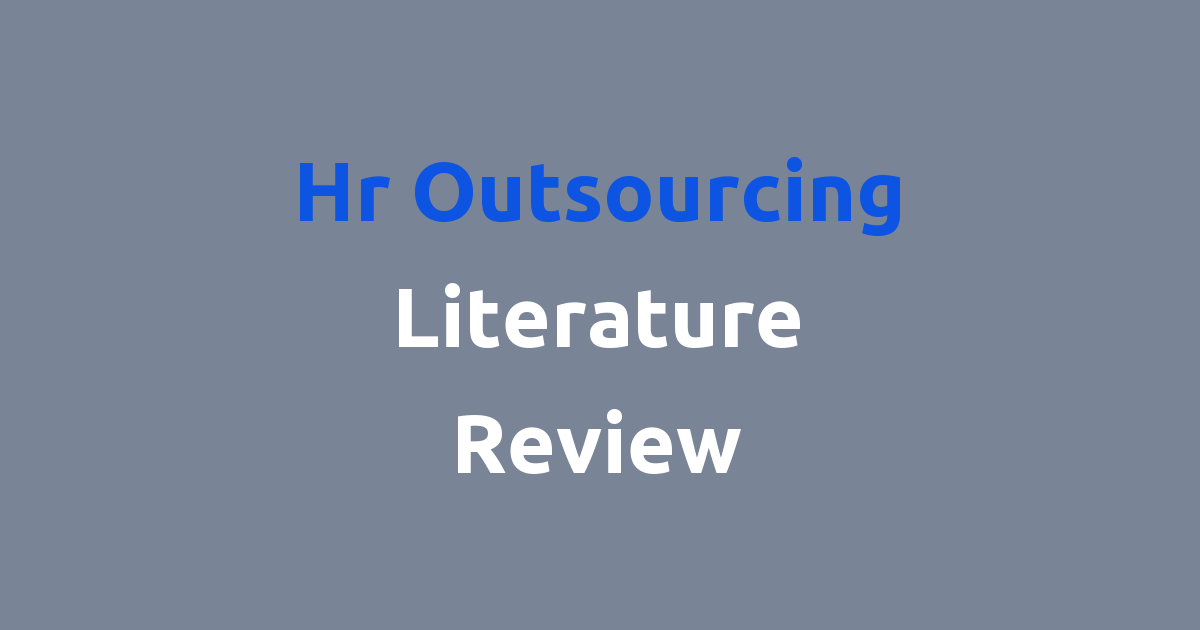Review of literature on HR outsourcing.
HR Outsourcing Literature Review
Introduction
In today’s competitive business environment, organizations are constantly looking for ways to streamline their processes and reduce costs. One area that has gained popularity in recent years is HR outsourcing, where companies delegate some or all of their human resource functions to external service providers. This literature review aims to explore the benefits and drawbacks of HR outsourcing, as well as examine the current trends and research in this field.
Problem Statement
Organizations often face challenges in managing their human resource functions efficiently and cost-effectively. Traditional HR practices can be time-consuming and resource-intensive, leading to high operational costs and reduced productivity. This has led many companies to explore alternative solutions, such as HR outsourcing, to improve their HR processes and achieve better business outcomes.
Existing System
The traditional HR model typically involves an in-house HR department responsible for recruiting, training, payroll, benefits administration, and other HR functions. While this approach has its merits, it can be inefficient and costly for many organizations, especially small and medium-sized enterprises with limited resources.
HR outsourcing offers a solution to these challenges by allowing companies to outsource specific HR functions to third-party service providers. This can include benefits administration, payroll processing, recruitment, employee training, and compliance management. By outsourcing these tasks, organizations can focus on their core business activities and reduce HR-related operational costs.
Disadvantages
Despite the potential benefits, HR outsourcing is not without its drawbacks. One of the main concerns is the loss of control over HR processes and data security. When HR functions are outsourced, companies may face challenges in maintaining visibility and oversight over these activities, which can lead to compliance issues and data breaches.
Additionally, outsourcing HR functions can also result in communication challenges and cultural differences between the organization and the service provider. This can impact employee morale and engagement, as well as the overall effectiveness of HR processes.
Proposed System
To address these challenges, organizations can consider implementing a hybrid approach to HR outsourcing. This involves outsourcing specific HR functions while retaining control over strategic HR activities in-house. By strategically blending outsourcing with in-house HR capabilities, companies can maximize the benefits of HR outsourcing while minimizing the risks and drawbacks.
Advantages
There are several advantages to HR outsourcing, including cost savings, increased efficiency, access to specialized expertise, and scalability. By outsourcing HR functions, organizations can reallocate resources to other strategic priorities, reduce operational costs, and improve overall business agility.
Furthermore, outsourcing HR tasks to specialized service providers can result in higher quality and more consistent HR services. Service providers are experts in their field and can offer innovative solutions, best practices, and industry insights that may not be available in-house.
Features
Some key features of HR outsourcing include:
- Customized HR solutions tailored to the organization’s specific needs and objectives
- Scalable services that can adapt to changing business requirements and workforce dynamics
- Advanced technology platforms for streamlined HR processes, data analytics, and reporting
- Compliance management to ensure adherence to legal and regulatory requirements
- Continuous improvement and innovation through ongoing collaboration and feedback
Conclusion
In conclusion, HR outsourcing has become a popular strategy for organizations looking to optimize their HR functions and drive business performance. By outsourcing specific HR tasks to external service providers, companies can improve efficiency, reduce costs, access specialized expertise, and enhance scalability.
While there are some challenges and risks associated with HR outsourcing, these can be mitigated through careful planning, communication, and strategic oversight. By adopting a hybrid approach to HR outsourcing and combining the benefits of outsourcing with in-house HR capabilities, organizations can achieve the best of both worlds and drive sustainable business growth.

